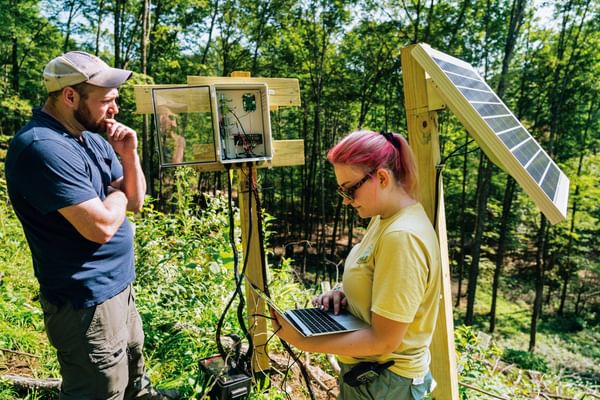- Undergraduate
Bachelor's Degrees
Bachelor of ArtsBachelor of EngineeringDual-Degree ProgramUndergraduate AdmissionsUndergraduate Experience
- Graduate
Graduate Experience
- Research
- Entrepreneurship
- Community
- About
-
Search
All Thayer News

Collaborations: Sensing the Ecosystem
Jul 01, 2022 | by Aimee Minbiole | Dartmouth Engineer
Engineering and studio arts major Emma Hazard ’22 has helped program, install, and maintain a network of sensors in a Dartmouth-owned forest in Corinth, Vt. Her work takes her to the computer, the workbench, and the woodland itself, which is under threat from the invasive emerald ash borer.

Emma Hazard '22 (right) is helping minimize the impact of the emerald ash borer on forests in Corinth, Vt.
Engineering and studio arts major Emma Hazard ’22 has helped program, install, and maintain a network of sensors in a Dartmouth-owned forest in Corinth, Vt. Her work takes her to the computer, the workbench, and the woodland itself, which is under threat from the invasive emerald ash borer.
The 700-acre ash-heavy forest offers a rare opportunity to study the trees and surrounding habitat while they’re still intact, says project leader David Lutz, a research assistant professor and lecturer in environmental studies. “Getting this far ahead of an invasive species and planning an experimental design well in advance is very novel.”
Hazard, with Lutz’s team, is exploring the ecological role white ash plays in forests and testing strategies for minimizing the impact of the emerald ash borer. It’s complex work that requires an understanding of engineering, computing, environmental science, and ecology, which might scare off any number of seasoned researchers, says Lutz. “You have to be comfortable being stuck and finding solutions.”
Hazard is learning new programming languages and building an app to collect, transmit, and filter environmental data from remote areas in real time. While some researchers love to put on hiking boots and bug spray, Hazard prefers the technical aspects. Nonetheless, she says, “It’s always fun to be out there and definitely worthwhile.”
The work draws expertise from a variety of research partners, including Cornell Lab of Ornithology, the University of Florida, the University of Vermont, and the US Forest Service, as well as Kevin Evans, Dartmouth’s director of woodland operations. “Ecosystems are complex places … and casting a wide net is the key to success,” says Lutz.
"Professor Lutz is adamant about student researchers taking an active part."
—Emma Hazard ’22
For contacts and other media information visit our Media Resources page.
